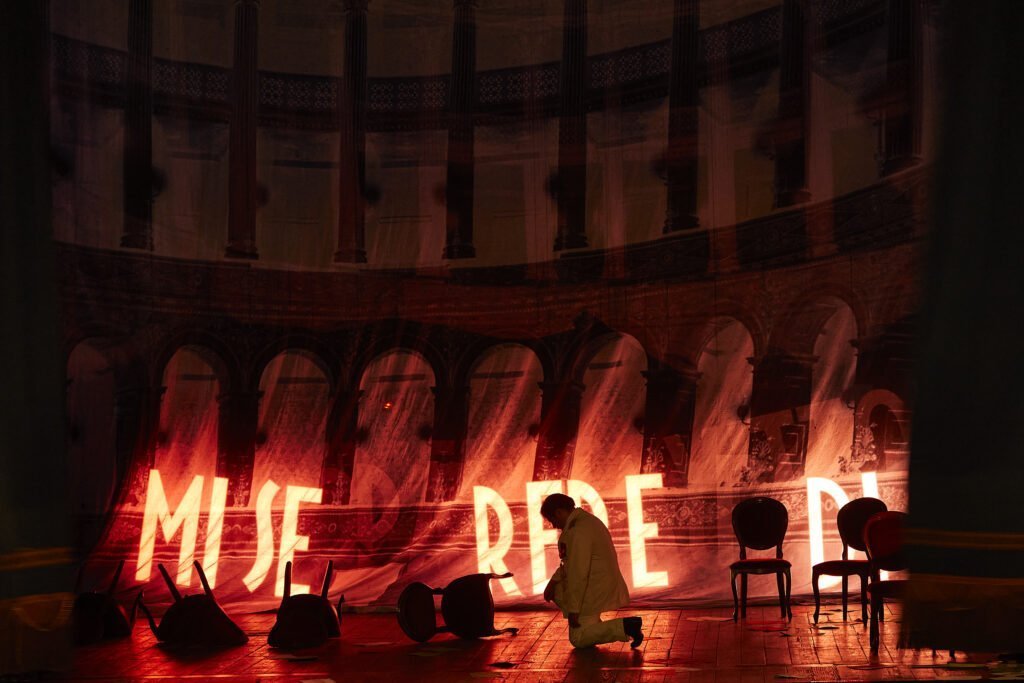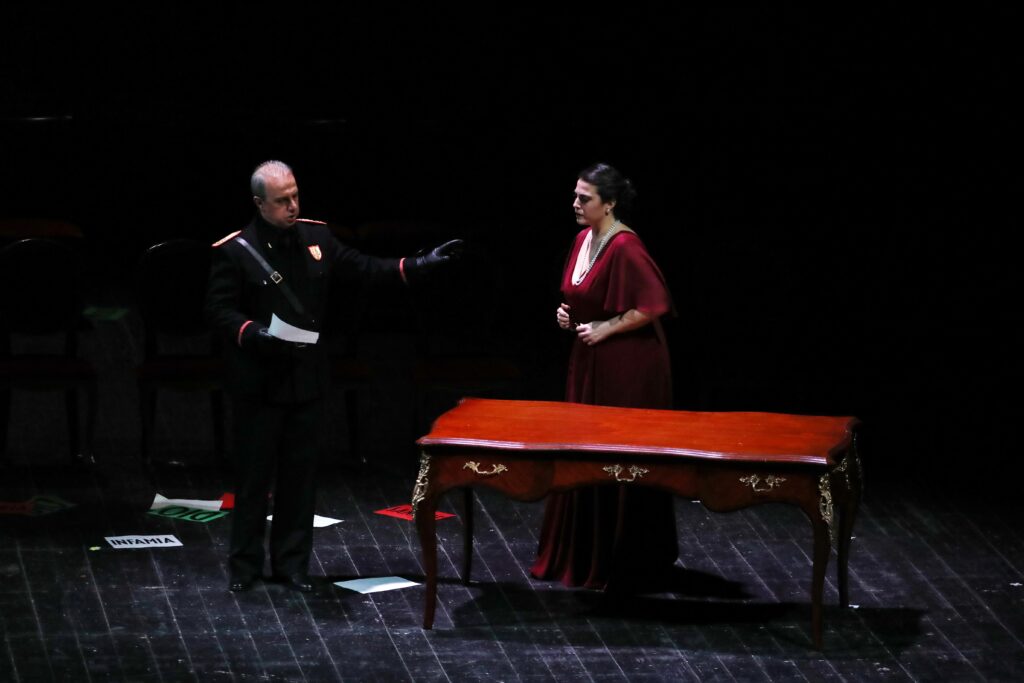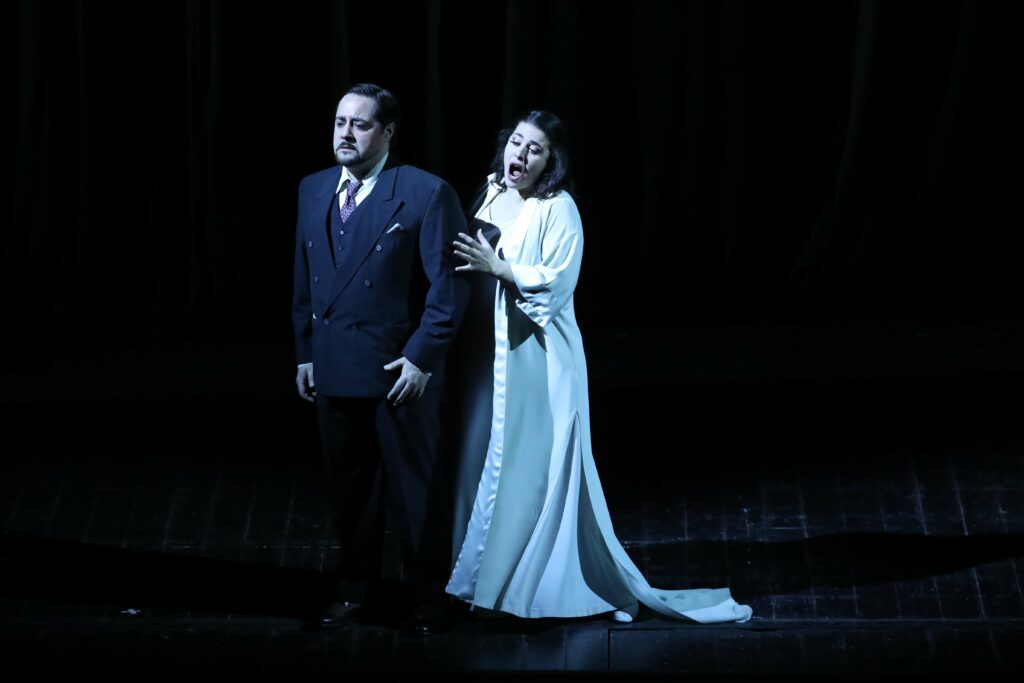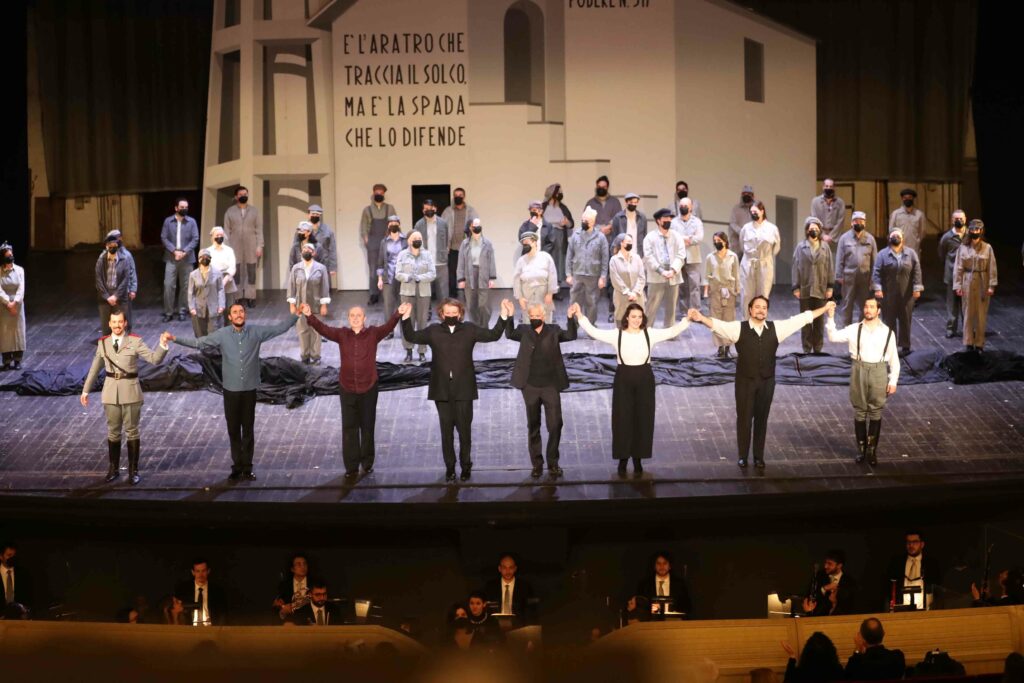Aroldo (Stiffelio) by Giuseppe Verdi. Opera in four acts. 1857. Libretto by Francesco Maria Piave, after his earlier Stiffelio. First performance at the Teatro Nuovo, Rimini, on 16 August 1857. Seen: 21 January 2022, Teatro Municipale. Opera Gazet reviewer: Marina Boagno.
Aroldo: Luciano Ganci; Mina: Roberta Mantegna; Egberto: Vladimir Stoyanov; Briano: Adriano Gramigni; Godvino: Riccardo Rados; Enrico: Giovanni Dragano; Direttore: Manlio Benzi; Orchestra Giovanile Luigi Cherubini; Coro Del Teatro Municipale Di Piacenza; Regia: Emilio Sala & Edoardo Sanchi
Music: 4,5*
Direction: 1*
Stiffelio, the opera from which Aroldo originates, was performed for the first time in Trieste at the end of 1850, and encountered – due to the very modern subject, little less than scandalous in those times – difficulties with censorship not unlike those Verdi had to contend with three years later for La traviata. The welcome, both from audience and critics, was mixed, for the same reasons. Therefore, Verdi and Piave started thinking about a makeover almost immediately, changing the time, the setting and, in part, also the history. For the new opera, written only six years later, a “neutral” historical period was chosen, the Middle Ages, and the protagonist, originally a priest of a Protestant sect, became Aroldo, a Scottish knight just back from the Crusades. For the first performance, Verdi chose the inauguration of the new Rimini theater, in August 1857. The opera was then performed in Bologna, Turin and Naples, but the audience gave it a lukewarm welcome, and soon Aroldo suffered, as did Stiffelio, the fate of numerous other works of the previous period. It was set aside and almost forgotten for a long time, also because Verdi and Piave were overwhelmed by the success of the so-called “popular trilogy”, Rigoletto, Trovatore and Traviata.
While some works of that period, such as Macbeth or Attila, fortunately return regularly to the stage these days, others remain rarities, and therefore this Aroldo deserves special interest. This production first returned to Rimini last summer, for the new inauguration of the theater, destroyed by a bombing in 1943 and rebuilt only in 2018. And now, thanks to a co-production, it is being staged in Ravenna, Piacenza, and Modena, with a different cast.
It is worth noting that although many parts of Stiffelio were used by Verdi in the writing of Aroldo, the two works are essentially different: if Stiffelio is above all the story of the devastating inner conflict of a pastor who preaches forgiveness, and is forced to admit to himself that “Il perdono è facile a un cuore non ferito” (forgiveness is easy for an uninjured heart), Aroldo is essentially just a common story of love and jealousy, adultery and repentance, in which forgiveness is so half-hearted (in contrast to the dramatic catharsis that concludes Stiffelio) that the ending remains almost open, as if the reconciliation between the two spouses is not so certain.

In this sense, the dramatic appeal of Stiffelio‘s story is lost in Aroldo. On the other hand, the six years between the writing of the two works make many parts of Aroldo, in particular the last act, musically more complete and refined.
The performance we witnessed in the Piacenza theater (one of the many jewels scattered throughout the Italian “provinces”) has mainly the merit of employing a cast of which any great theater could be proud. The three principals, Luciano Ganci in the title role, Roberta Mantegna in that of Mina, and Valdimir Stoyanov, Egberto, are three artists of huge international standing.

Luciano Ganci (just back from two great successes at the Vienna State Opera) is, among his colleagues, the only one who had a partial experience of the opera, after being the protagonist of the acclaimed edition of Stiffelio staged at the Verdi Festival in Parma in 2017. In the even more demanding role of Aroldo, the tenor showcases all the qualities that we have come to know: a voice with a beautiful timbre, a technique that allows him to avoid any risk of unevenness – especially in the command of the registers – to reach blazing high notes, a varied and effective phrasing, all accompanied by an excellent stage ability.
Mina has the beautiful, flexible voice of Roberta Mantegna (which we already enjoyed live last year in Macerata in Trovatore). Some occasional minimal harshness in the high register is amply compensated by the charm of her “piano” and “pianissimo” and of her varied phrasing, and does not diminish the validity of her performance.
Last but not least, Vladimir Stoyanov has always mirrored (we first met him as a very young student at the Boris Christoff Academy in Rome, when he struck us with an unforgettable “Eri tu”) our personal ideal of a Verdi baritone. At the base, there is his beautiful dark voice of authentic baritone. But there is also much more: the adherence to the “parola scenica” (scenic word), the constant elegance and softness of the phrasing, the intense interpretation of the character.
Among the minor roles, we are pleased to point out the beautiful bass voice of Adriano Gramigni, who personifies the austere “solitario” Briano.
There would be little left to say if this show – musically enjoyable also thanks to the careful direction of Manlio Benzi, the “Orchestra Giovanile Luigi Cherubini” and the Choir of the Teatro Municipale of Piacenza directed by the always excellent Corrado Casati – were not handicapped by a direction that, in our opinion, is burdened by all the defects of the “invention at all costs” that we have so often denounced.

We are willing to acknowledge that the opera is one of the few whose plot lends itself, if so desired, to being transposed into a modern time, or even into the present one, especially since the artifice of transforming a nineteenth-century priest into a crusader knight is already evidently feeble in Verdi’s original. In this case, however, the director Emilio Sala and his numerous team members have made a very deliberate choice and, in our opinion, totally without justification: actually, they have linked the plot of Aroldo to the history of the theater in which it was performed for the first time. We tried in vain to find a logical thread in the reasoning: Aroldo made his debut in Rimini in 1857 – the Rimini theater was destroyed by a bombing in 1943 – therefore we will set the opera in the fascist period and during the Second World War and Aroldo will be an Italian officer returning from Mussolini’s colonial wars in Africa.
As you might see, no logical link is possible. It is simply a pretext, an occasional choice, one of the many “inventions” by directors who cannot bear to remain faithful to a text and claim to replace it with another of their own creation. The choice, in this case, also involved small, but significant changes to the libretto. Aroldo’s aria, “Sotto il sol di Siria Ardente” (Under the Burning Syrian Sun) becomes “Under the Abyssinian sun,” Ascalona becomes Eritrea, obviously making the request to tell the deeds of King Richard obsolete. They even go to the extreme of introducing, perhaps for greater “realism”, the typical fascist word “camerata.”

And, finally, the storm of the last act, in which the choir, as it will happen many years later in Otello, expresses its anxiety about the fate of the boat carrying Mina and her father, is absurdly superimposed on the images of an aerial bombardment (one of the numerous vintage black-and-white films that haunt the production). We even listen to some lines of a fascist propaganda song. But what is perhaps most disturbing is the nowadays almost inevitable “dramatization” of the overture, in which – as if the dumb audience needed help to understand the situation – we see Mina in bed with her lover.
In short, in our opinion, we witnessed a visually bleak show, a botched direction, full of inconsistencies and contradictions. And, for us, it was painful to see such an excellent and formidable cast forced into such a straitjacket.

Thanks to Marina Boagno for her thorough and interesting review of Aroldo. I fully agree with Olivier Keegel’s comments about the opera displacement question. In my opinion, the fascist setting is both nonsensical and mere bad taste. Stagings like these add nothing to an opera, they detract instead.
I also don’t see any logical link between the Rimini theater being destroyed by a bombing in 1943 and setting the opera in the fascist period and during the Second World War, Aroldo being an Italian officer returning from Mussolini’s colonial wars in Africa. But the fact that this discussion is held is in itself a bad sign: we analyze the success of the displacement in time, and we seem to have stopped wondering at all about the essential question: what use is any displacement in time, and what on earth does it add to the opera as conceived by… Read more »
I would dare to phrase the question differently: wasthere something in the staging that prevented me from enjoying the performance? Didthe fact that the characters wear a fascist army uniform have a negative influence on my experience? I tend to answer negative in this particular case. Take Egberto’s aria at the beginning of the second movement as an example. Dressed in a 1930s costume, he sings from behind a desk. Would this scene really have been much better if he was wearing a chain mail ? Not for me anyway. If, on the other hand, he would have been dressed… Read more »
I was also present at the reviewed performance. As far as the musical aspect is concerned, I completely agree with what Marina writes. Especially Luciano Ganci was impressive with a tireless, if somewhat metallic sounding voice. I would, however, be a little more lenient on the directing. Surely an analogy can be found between a crusader returning from the promised land and an officer returning home after a stay in the colonies. The inclusion of the bombing of the city in the context of the inauguration of the Teatro Galli in Rimini is perhaps a bit far-fetched in itself, but… Read more »
Ik was zelf ook aanwezig op de gerecenseerde voorstelling. Wat het muzikale aspect betreft sluit ik me volledig aan bij hetgeen Marina schrijft. Vooral Luciano Ganci was indrukwekkend met een onvermoeibare, zij het ietwat metalige klinkende stem. Wel zou ik iets milder zijn voor de regie. Er kan toch wel een analogie gevonden worden tussen een kruisvaarder die terugkeert uit het beloofde land en een officier die thuis komt na een verblijf in de kolonies. Dat, in het kader van de inhuldiging van het Teatro Galli in Rimini, het bombardement op de stad erbij gehaald wordt is op zich misschien… Read more »